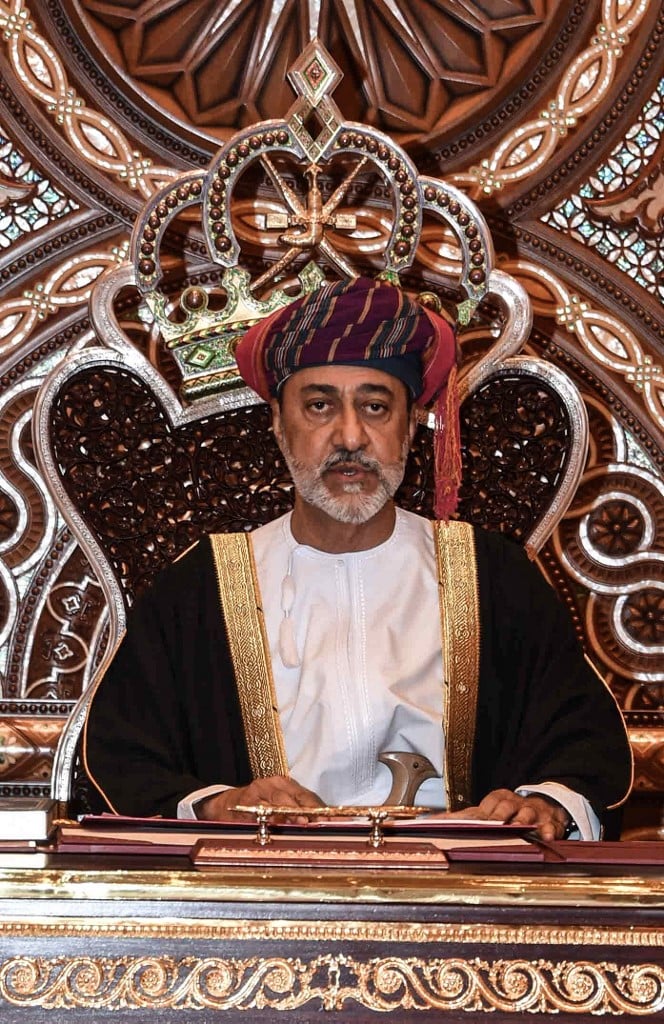Haitham bin Tariq bin Taymour was sworn in on 11 January 2020 as the new sultan of Oman, succeeding his cousin Sultan Qaboos bin Said bin Taymour, who died of colon cancer earlier in the month after nearly half a century in power.
The question of succession had long been a cause of concern because Sultan Qaboos did not have a crown prince, brother or son in the Gulf state, which has always been an oasis of tranquility in a troubled region.
These concerns increased after the sultan was diagnosed cancer in 2014, which greatly affected his vitality and political performance. In addition, he had not assumed power legitimately, seizing power from his father Said bin Taymour in a coup in July 1970 and exiling him to London where he lived for two years before passing away in October 1972.
Hours after the announcement of Sultan Qaboos’ death, the Supreme Defence Council invited the Ruling Family Council to convene to determine who would succeed him.
Article 6 of the Omani constitution, officially known as the White Book, states the following: ‘The Royal Family Council shall, within three days of the throne falling vacant, determine the successor to the throne. If the Royal Family Council does not agree on a choice of a sultan for the country, the Defence Council shall instate the person designated by His Majesty the Sultan in his letter to the Royal Family Council.’

However, the Royal Family Council decided to respect the sultan’s will, which named his cousin Haitham as his chosen successor. Article 4 of the White Book states: ‘The system of governance is Sultani, hereditary in the male descendants of Sayyid Turki bin Said bin Sultan, provided that whomever is to be chosen from among them as successor shall be a Muslim, mature, rational and the legitimate son of Omani Muslim parents.’
Haitham was born on 13 October 1954, studied at Oxford University in the United Kingdom and graduated in 1979. In 1983, Sultan Qaboos appointed him as the first president of the Oman Football Association, a position he held until 1986, when he became undersecretary of state for political affairs. He then served as secretary general of the Ministry of Foreign Affairs from 1994 to 2002, when he was chosen as minister of heritage and culture. He held the post until he was sworn in as the new sultan.
He is known for his love of sports, especially football. He continues to hold the post of honorary president of al-Seeb, a sports club based just outside the capital Muscat. He is married to Ahed bint Abdullah bin Hamad al-Busaidi, a member of the ruling family, with whom he has four children: Dhi Yazan, Balarab, Thuraya and Umaymah.
Haitham is one of the seven sons of Tariq bin Taymour, the half-brother of Sultan Said bin Taymour. Tariq was known for his progressive views on governance, which his half-brother saw as a western European style. During his tenure as mayor of Muscat, Tariq imposed fines for dumping garbage in the streets, and he was the first to build public toilets in the city. Later, major disagreements arose between the brothers, reportedly because Tariq was linked to some of the revolutionaries of Zafar who carried out an armed rebellion against the sultanate in 1965, and because of claims that Tariq attempted to overthrow his brother. As a result, Tariq was removed from the country until Sultan Qaboos ousted his father in 1970. Tariq then returned and served as prime minister until 1972. He later assumed the post of sultan’s advisor for political affairs until his death in 1980.
Haitham was long considered one of Sultan Qaboos’ closest confidants and shared his vision of governance and Oman’s foreign and domestic policies. In 2013, Sultan Qaboos appointed Haitham as chairman of the Committee for the Development of the Sultanate. He was also appointed chairman of the Conference of Presidents of Arab Supreme Courts and head of the Omani delegation for the conference in 2016. The sultan also chose Haitham as his special envoy on many occasions, underlining his position as one of the pillars of the state.
In his inaugural speech, Haitham emphasized the similarities with his predecessor, saying he was “determined to follow and build on Sultan Qaboos’ approach, and will work to spare the region conflicts and disputes while achieving economic integration”.
The constitution gives the sultan broad powers, including those of prime minister, general command of the armed forces, the power to appoint members of the Council of State, Oman’s legislative council, and appoint and discharge deputies, members of the government and undersecretaries. The sultan also presides over specialized councils and appoints their members or chair people, appoints or discharges senior judicial officials, announces a state of emergency, general mobilization or war, promulgates and enacts laws, signs international conventions and agreements, appoints ambassadors, envoys and representatives of the sultanate abroad and pardons penalties.
Historically, Oman has maintained a neutral political position and played the role of mediator in several crises affecting the region, notably the crisis between Qatar on the one hand and Saudi Arabia, the United Arab Emirates and Bahrain on the other. Oman also refused to participate in the Saudi-led military alliance fighting the Houthi rebels in Yemen, and it has acted as a go-between in the Iran-United States and Saudi-Iranian disputes.


